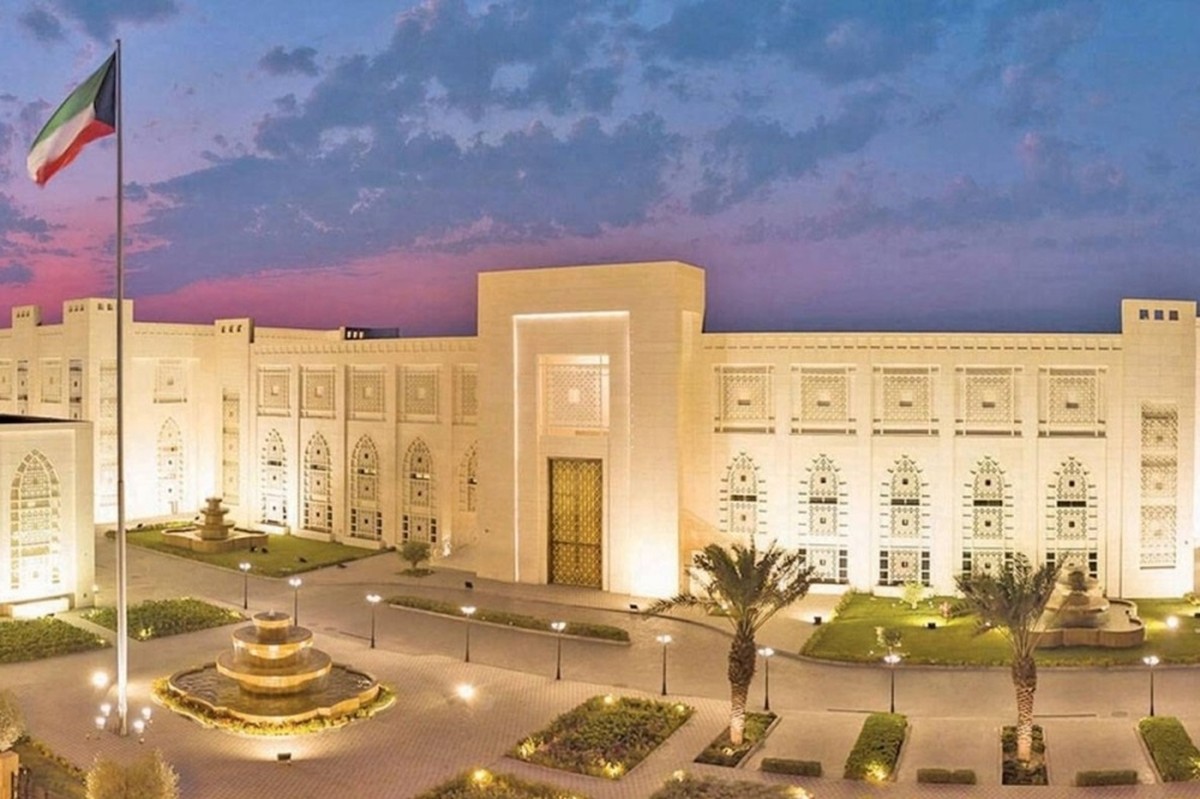20/11/2025
20/11/2025

KUWAIT CITY, Nov 20, (Agencies): Kuwait’s Ministry of Foreign Affairs on Thursday strongly condemned the Israeli occupation prime minister’s entry, with several aides, into occupied Syrian territory, calling it a blatant violation of Syria’s sovereignty, a clear breach of international law, and relevant UN Security Council resolutions. In a statement, the ministry reiterated Kuwait’s full support for Syria’s independence and sovereignty over all its territory. It urged the Security Council to uphold its responsibilities by ensuring full compliance with international legitimacy resolutions, especially the 1974 ceasefire agreement, and called for stopping ongoing Israeli attacks on Syrian territory and other countries in the region.
Israeli Prime Minister Benjamin Netanyahu on Wednesday toured the buffer zone on the Syrian side of the Golan Heights, the prime minister’s office said, amid reports of contacts aimed at reaching a new security arrangement in the area. Netanyahu was accompanied by Israeli Defense Minister Israel Katz, Foreign Minister Gideon Sa’ar, military chief Eyal Zamir, and Shin Bet director David Zini, among others. “The prime minister arrived at an IDF (Israel Defense Forces) outpost where he observed the area, and then held a security briefing,” the office said in a statement. Speaking to soldiers at the outpost, Netanyahu said Israel attaches “great importance” to its capabilities, “both defensive and offensive, in this area,” to “protecting our Druze allies” in the Syrian side of the Golan Heights, and “above all, to safeguarding Israel and its northern border facing the Golan.”
“This is a mission that can develop at any moment,” he said, without elaborating. Israel and Syria have been holding U.S.-brokered talks on a security agreement concerning areas of southern Syria that Israeli forces have been controlling after the fall of Bashar al-Assad in December 2024. Earlier this month, Syrian interim leader Ahmed al-Sharaa visited the White House, where he and U.S. President Donald Trump discussed a possible security deal and partial U.S. sanctions relief. In the following interviews, al-Sharaa confirmed the talks but denied any imminent agreement, noting that any deal would require Israel to pull back from the areas of southern Syria it has held, a condition Israel has rejected. Earlier this week, Israel’s public broadcaster Kan reported that the talks have stalled.
The Israeli military carried out barrages of airstrikes in southern Lebanon Wednesday on what it said were Hezbollah sites, including weapons storage facilities, after a drone strike earlier in the day killed one person and wounded several others, including students on a bus. The new wave of strikes came a day after an airstrike killed 13 people in the Palestinian refugee camp of Ein el-Hilweh, the deadliest of Israeli attacks on Lebanon since a ceasefire in the Israel-Hezbollah war a year ago. Meanwhile, after Israel reported its soldiers were fired on in southern Gaza, health officials in the territory said Israeli strikes killed at least 25 Palestinians in one of the deadliest days in Gaza since the Oct. 10 ceasefire agreement took effect. Separately, Israeli Prime Minister Benjamin Netanyahu traveled to a buffer zone in Syrian territory that Israel seized last year.
Israel’s military warned Wednesday it would strike targets in several villages in southern Lebanon, describing them as Hezbollah infrastructure, and called on people to move away from the locations. More than an hour later, strikes began in the villages of Shehour and Deir Kifa. Israel’s military said Hezbollah was working to reestablish itself and rebuild its capacity in southern Lebanon, without providing evidence. It said the weapons’ facilities targeted were embedded among civilians and violated understandings between Israel and Lebanon. Israel agreed to a ceasefire and withdraw from southern Lebanon last year and Lebanon agreed to quell Hezbollah activity in the area.
Earlier Wednesday, an Israeli airstrike on a car in the southern Lebanese village of Tiri killed one person and wounded 11, including students aboard a nearby bus, the Lebanese Health Ministry and state media said. State-run National News Agency said the school bus happened to be passing near the car that was hit. Israel’s military later said it killed a Hezbollah operative in the drone strike. In Ein el-Hilweh refugee camp, just outside the port city of Sidon, life appeared normal Wednesday. Lebanese authorities prevented journalists from entering. At the scene of the strike, paramedics searched for human remains around a wall that was stained with blood. Several cars were burned and broken glass and debris littered the ground. The Israeli military said it struck a Hamas training compound that was being used to prepare an attack against Israel and its army. It added that the Israeli army would continue to act against Hamas wherever it operates. Hamas denied in a statement that the sports playground that was hit was its training compound. Gaza’s Ministry of Health said that Israeli strikes killed 25 Palestinians and injured 77 since the afternoon in one of the deadliest days since the Oct. 10 ceasefire took effect.
Hospital officials who received the bodies said they came from on both sides of the yellow line established in last month’s ceasefire. The boundary splits the enclave in two, leaving the border zone under Israeli military control while the area beyond it is meant to serve as a safe zone. Officials at al-Ahli, Shifa, Nasser and Kuwaiti hospitals reported they received the bodies of those killed from Gaza City, Khan Younis and the Muwasi area, the southern Gaza displacement camp. An Israeli strike also killed one person in Shijaiyah, a Gaza City neighborhood outside the safe zone where Israeli forces remain deployed. The Israeli military said its strikes responded to militants who had opened fire on Israeli forces in Khan Younis earlier in the day. It said no soldiers were killed. On Wednesday Hamas condemned the Israeli strikes across Gaza City and Khan Younis, calling them a “shocking massacre.”
In a statement, the group denied firing toward Israeli troops. Israeli strikes have decreased since the ceasefire agreement took effect, according to Gaza’s Health Ministry, though they have not stopped entirely. After Wednesday evening’s strikes, the ministry, which does not distinguish between civilians and combatants, has reported more than 300 deaths since the truce began, an average of more than seven per day. Each side has accused the other of violating its terms, which include increasing the flow of aid into Gaza and returning hostages - dead or alive - to Israel.


